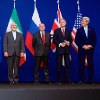![]()
Sun, Nov 21, 2010 | The Meir Amit Intelligence and Terrorism Information Center
Iran Prepares For Conflict Over the Caspian Sea Issue
This week, President Ahmadinejad departed for a two-day visit to Baku, the capital city of Azerbaijan, to take part in a conference of Caspian Sea countries. The conference is attended by leaders of the five countries which border the Caspian Sea: Iran, Russia, Azerbaijan, Kazakhstan, and Turkmenistan. The discussions will revolve around the status of the Caspian Sea on the backdrop of the disputes between the countries over its division between them.
The Caspian Sea is the world’s largest lake and boasts abundant oil and natural gas resources. It is home to a population of sturgeon, the fish whose eggs are used to produce caviar. In two treaties signed between Iran and the USSR in 1921 and 1940, the two countries agreed on equal division of the Caspian Sea waters between them. After the dissolution of the USSR in 1991, the three newly-independent countries, Azerbaijan, Kazakhstan, and Turkmenistan, refused to recognize the two treaties and demanded that the Caspian Sea resources be divided proportionally to the coastline length of each of the five countries. That proposal is detrimental to Iran’s interests, as its coastline length is relatively small compared to the other countries bordering the Caspian Sea. If the proposal is passed, Iran will be able to use as little as 11 percent of the Caspian Sea resources. Iran does not accept the demand and insists on an equal division between the five littoral countries, which would give it rights to at least 20 percent of the Caspian Sea.
On the eve of the Caspian Sea countries conference in Baku, top Iranian officials announced that they intended to insist on Iran’s demand to gain at least 20 percent of the Caspian Sea waters, and strongly oppose the proposals made by the other littoral countries. Foreign Minister Manouchehr Mottaki declared that Iran opposed one-sided treaties concerning the status of the Caspian Sea which do not serve the interests of all the countries bordering it. He noted that Iran’s position was that each country must be given a fair and proportional part of the Caspian Sea to maintain peace and sustain regional stability for a long time (Mehr, November 9).
Mohammad Mehdi Akhoundzadeh, the president’s advisor on Caspian Sea affairs, also announced that Iran strongly insisted on a 20 percent share of the Caspian Sea. He noted that Iran would never give up its rights, and that there could be no treaty concerning the legal status of the Caspian Sea without taking Iranian views into consideration. At the end of a round of meetings held by the Caspian Sea workgroup in Tehran last week, the president’s advisor said that any decision pertaining to the legal status of the Caspian Sea should be agreed upon by all parties and made on the basis of the principle of justice (Fars, November 11).
In recent days, the issue has also been taken up by the Iranian media, which called on the government not to compromise with regard to Iran’s rights in the Caspian Sea. Tabnak, a website affiliated with the pragmatic conservative bloc, published a strong-worded article demanding that the government defend Iran’s national interests and reject any concessions. In the article, the website examined the historic background for Iran’s claims on Caspian Sea waters, claiming that the government must demand the realization of the agreements signed by Iran in the previous centuries with the USSR, and not to agree to less than one fifth of the Caspian Sea resources. The website also accused the other countries bordering the Caspian Sea of severely depleting its resources, polluting it, and causing a serious ecological disaster that threatens Iran’s interests and citizens. It issued a call to exercise Iran’s historic rights and even demand compensation for the pollution of the sea. Iranian diplomats, the article states, must be wise to avoid the trap set by the enemies of Iran, who seek to threaten its territorial integrity. The website argues that if the four countries do not agree to adopt the treaties signed in the 20th century between Iran and the USSR, Iran will have the right to demand the return of the Caucasus territory transferred from Iran to Russia following the treaties of Golestan (1813) and Turkmenchay (1828), which it signed with Russia in the 19th century (Tabnak, November 13).



 RSS
RSS











#Iran Prepares For Conflict Over The #Caspian Sea Issue | #Russia #Azerbaijan #Kazakhstan #Turkmenistan http://j.mp/e1Zjyg
#Iran Prepares For Conflict Over The #Caspian Sea Issue | #Russia #Azerbaijan #Kazakhstan #Turkmenistan http://j.mp/e1Zjyg
RT @CrethiPlethi: #Iran Prepares For Conflict Over The #Caspian Sea Issue | #Russia #Azerbaijan #Kazakhstan #Turkmenistan http://j.mp/e1Zjyg